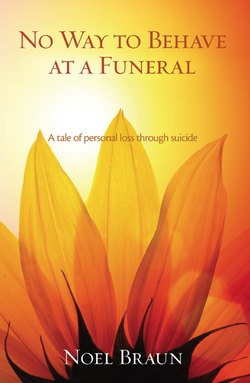Читать книгу No Way to Behave at a Funeral - Noel Braun - Страница 7
На сайте Литреса книга снята с продажи.
Preface
ОглавлениеA number of reasons lie behind my writing this book. Foremost, I want to honour my wife Maris for the forty-one years that we shared together. I loved her all those years and continue to love her. She is a continuing presence and influence in my life. I like to think of this book as a love story, just a little different from what you would normally find in bookshops, libraries, movies and TV.
Secondly, my hope is that this book may give some comfort and support to those whose lives have been shattered by a loved one’s suicide. My heart goes out to them. The suicide of a loved one tops the list of stressors and permanently alters the lives of survivors. What my bereavement has bought to me is vulnerability, but it is a vulnerability that has become a gift for me, and for others, by sharing it. By sharing my pain, my loss, my emptiness, I hope that others who have had a similar experience will share their pain, their grief, their anguish, their feelings of inadequacy and inability to cope.
I hope that the men who read this book will give themselves permission to feel and to weep. Men tackle grief in a different way, often totally avoiding it. Some men build a fortress around their feelings. The pain of loss is just as intense for men as for women, but society praises those men who ‘hold up well’, who maintain a ‘stiff upper lip’, who adopt the strong, silent stance we are supposed to display. The belief that pain can be overcome by biting your lip is tied to the fear that it is the only thing that can be done, short of letting down the guard and expressing true feeling, as if the stoic mask provides some protection. On the contrary, instead of shielding against pain, the mask hurts. In hiding pain from others, it has to be carried silently and alone.
Expressing emotion in our own way helps the process of healing. To suppress one’s grief and send it underground can be destructive as it can emerge in unexpected ways. In the words of Shakespeare:
Bid sorrow speak; the grief that does not speak
Whispers the o’er-fraught heart and bids it break.
Macbeth, IV, iii
I know I can’t tell anyone how to grieve or how to emerge from their grief. Each of us is unique and has to find our own way and in our own time. There is no timetable to tell us how long it will take. However, the lessons I have learned after my wife’s suicide may help others to understand their own grief. We had no choice in the tragedy, but we do have a choice in how we respond to it. One important lesson is that there is hope in the worst of situations.
Thirdly, through this book, I would like to thank all those people who helped to ease my anguish. Where would I be without the support of my family and many friends? I am also grateful to the many people I met along the way. Some names I have changed. I have attempted to recreate the many conversations that took place during the period of my story and, although I may not have remembered the exact words, I have endeavoured to record the sentiments expressed. In particular, I would like to thank those friends who have allowed me to reprint their letters. Their letters of support are just a sample of the many I received describing the beautiful person that was Maris.
There is nothing I would not do to have Maris back. I dedicate this book to her memory. She encouraged me to persevere. Her spirit continues to inspire me.
Connect with someone who cares:
Lifeline
13 11 14
24-Hour Confidential
Telephone Counselling
www.lifeline.org.au
Beyond blue
1300 22 46 36
www.beyondblue.org.au
SANE Australia
1800 18 72 63
www.sane.org
